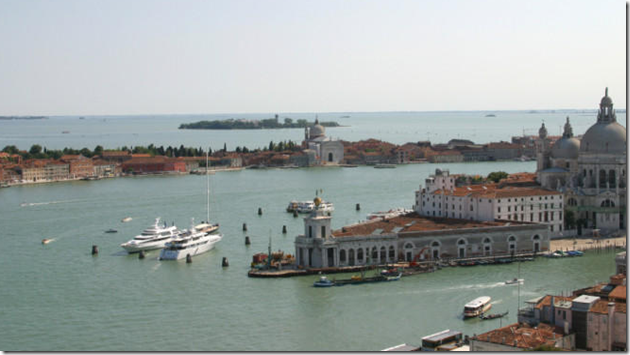
While in Venice I will be staying at the Bauer Palladio Hotel & SPA. It is an amazing building designed in the year 1500 by the world-renowned Renaissance architect Andrea Palladio. It is one of his 18 surviving villas of the Veneto. Here are a few books if you want to read up on the architecture of Palladio
It has a private garden (a rarity in Venice) 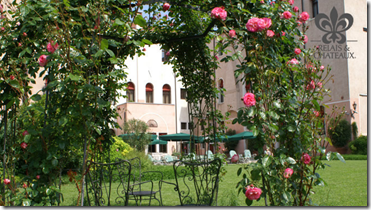
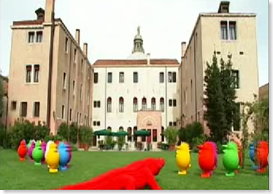
and breathtaking lagoon views (this is where I will be view the fireworks display on Saturday night. Read more about that below)
Public areas have Venetian terrazzo floors, original open-brickwork walls, and antique furnishings; trelliswork stencils and Murano-glass lanterns. It is located on the Giudecca Island just across the canal basin from Venice.
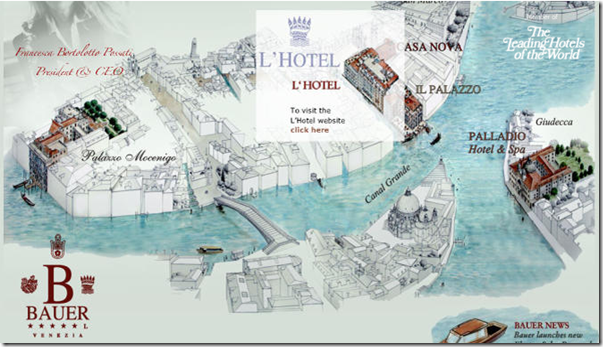
Map of the location of the Palladio Spa across from the main island of Venice
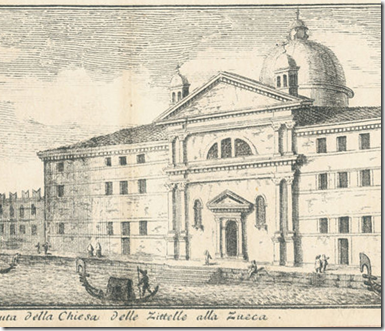
The Palladio was designed by Andrea Palladio in 1500
I will reach the property by taking the hotel's innovative B-Mare, a solar-powered shuttle between the main Hotel adjacent to Piazza San Marco, a mere 10-minute blissful vaporetto ride.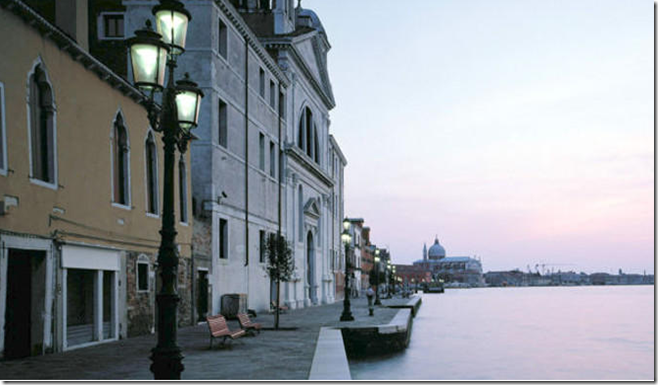
Setting an unprecedented example in eco-friendly efforts, the BAUER, Venice's first luxury hotel and one of the most prestigious family-run properties, has purchased a revolutionary energy-efficient nautical system for its new
Hotel Palladio.
B MARE shuttle boat. 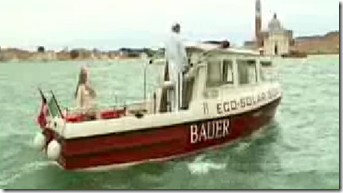

Created by Posidonia Srl and MW Lugano, leaders in Europe for their electric propulsion and solar-energy MW Line™ of boats, this electro solar powered system allows the B Mare vaporetto (Bauer of the Sea) to operate with no pollution, no noise, and no waves between the Bauer's main hotel near St. Mark's Square and the new Bauer Palladio Hotel & Spa on Giudecca Island, just across the lagoon.
Bauer Hotel Chair & CEO, Francesca Bortolotto Possati, is the first in Venice to make a substantial effort in providing clean-energy water transportation. Bortolotto Possati is a passionate Venetian who works tirelessly to maintain her birthplace and home as a top travel destination, and to prevent Venice's disappearance. "I feel it is my duty to help maintain and preserve the architectural integrity and atmosphere of this unique city for years to come," says Bortolotto Possati. "My family has lived in Venice for many generations and it is my goal to keep our city preserved to every extent possible."
There are 7 rooms on the second floor all with spectacular views of the lagoon, the Doge's Palace, and St. Mark's Square.
http://www.expedia.com/pub/agent.dll/qscr=dspv/htid=1510712/crti=4/hotel-pictures

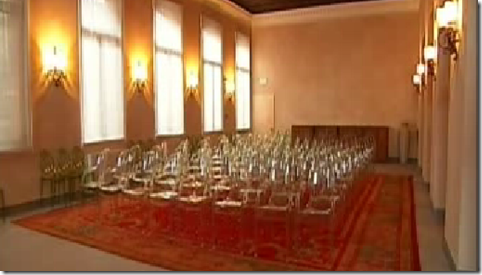


I thought this meeting room was interesting. It is a little hard to see, but those are rows of Philippe Starck Ghost Chairs, a whole room of them!!!
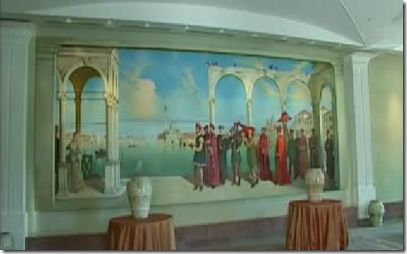
I have just found out that I have an extra treat in store for me on this visit to Venice - I am there juring the Redentore, one of the Venetians' most treasured festivities which culminates in a spectacular firework display in the evening with the unbeatable backdrop of Saint Mark's Basin. A play of lights and reflections produce a kaleidoscope of colours with the silhouetted spires, domes and bell towers of the city behind.
All of which I will be able to view from my room across the Giudecca Canal! I don't think it gets any better than that.
The origin of the festival was to celebrate the end to the plague, that raged through the city in the three years between 1575 and 1577. Aided by the high density of the population, the disease spread through the city, causing terrible losses. Almost 50,000 died, which was more than a third of the city's inhabitants.
On September 4, 1576, the Senate decided that the Doge should announce the vow to erect a church dedicated to the Redentore (Redeemer), in return for help in ending the plague.
On July 13, 1577, the plague was declared definitively over and it was decided that the city's liberation from the terrible disease should be celebrated on the third Sunday in July.
The Redentore today
At sunset the well illuminated boats, decorated with boughs and coloured balloons, begin congregating in Saint Mark's Basin and the Giudecca Canal. In the boats people eat traditional food, waiting for the firework display, which begins at 11.30pm and lasts until after midnight. The weekend ends with a Gondola Regatta
A few of the sites to see in Venice
The Rialto Bridge
St Mark's Square Campanile
Venetian Palace
Canal Scene
The Zattere: A Spacious Waterfront Promenade
The Zattere was constructed in 1519 as a landing stage for timber, but is now a waterfront promenade lined by a series of notable buildings and monuments.
The Zattere runs along virtually the entire southern shore of the Dorsoduro district of Venice. It offers superb views of the spectacular Palladian architecture on the island of Giudecca (That's where my Hotel is located)immediately to its south.
photo Wai Heng Chow - FOTOLIA
The westernmost point of the Zattere, known as the San Basilio, is named after a church, long since demolished, which was once located there.
The yellow-fronted Scuola dei Luganagheri, a few doors along, was formerly a sausage maker’s guild, but is now a restaurant, the only remaining evidence of its previous use being the two marble tablets either side of a statue of Saint Anthony.
Dorsoduro is one of six sestieri or districts of central Venice, and is located on the south-western side of town. It includes the long southern shore of Venice which faces over the water to the Giudecca.
It houses some of the most picturesque canals and palazzi, and some of the town's great art showcases, without the pretension and tourist traps that you might expect. It's a studenty area, home to Venice's Ca' Foscari University, and has more late-night drinking bars than the rest of Venice. The general vibe is artistic, youthful and relaxed.
Dorsoduro highlights
Accademia - Venice's great art gallery
Peggy Guggenheim Collection - modern art in an unusual palazzo on the Grand Canal.
Santa Maria della Salute - this church dominates several of Venice's most famous views.
Ca' Rezzonico - a museum of the 18th Century in the Grand Canal palazzo where Robert Browning died.
San Sebastiano - a colourful church decorated almost entirely by Paolo Veronese, who is also buried here..
The Zattere - a long promenade along Venice's southern shore, facing over the water to the Giudecca.
Church of the Carmini - large church with paintings by Lorenzo Lotto and Cima da Conegliano. The adjacent Scuola has a ceiling by Giambattista Tiepolo.
Very Cool Google Map of Venice
This is a fascinating Google Map of Venice and the surrounding vicinity, that I found on the Internet. It is an overlay of photos. Just click on the photo and you can see what that area looks like at ground level. Click here to go to this amazing web-site.
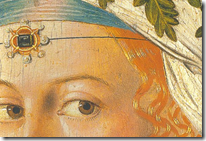


My reading on the plane is the novel on the life of: Lucrezia Borgia: Life, Love, and Death in Renaissance Italy
This book was recommended to me by Albarosa, a reader of my Blog. She recommended novel written by the author Maria Bellonci, but all I could find on short notice was by the author Sarah Bradford.
(BTW I wish the fashion of wearing a jewel on our forehead would come back into style)
Lucrezia Borgia who was married to Alfonso d'Este (Prince of Ferrara) in 1520. You can read more about her
here.
"Several rumors have persisted throughout the years, primarily speculating as to the nature of the extravagant parties thrown by the Borgia family. Many of these concern allegations of incest, poisoning, and murder on her part; however, no historical basis for these rumors have ever been brought forward, beyond allegations made by the rivals of the Borgias. It is rumored that Lucrezia was in possession of a hollow ring that she used frequently to poison drinks"
"Lucrezia's father was the powerful Renaissance Valencian who later became Pope Alexander VI. Lucrezia's family came to epitomize the ruthless Machiavellian politics and sexual corruption alleged to be characteristic of the Renaissance Papacy. Lucrezia was cast as a femme fatale, a role she has been portrayed in many artworks, novels and films."
Her life and the times she lived in makes for Juicy reading!!!
Portrait of a Woman by Bartolomeo Veneziano, traditionally assumed to be Lucrezia Borgia
ciao
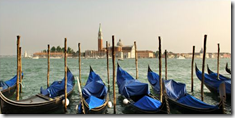



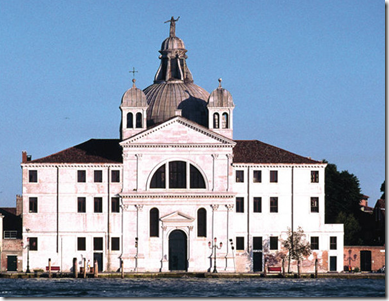
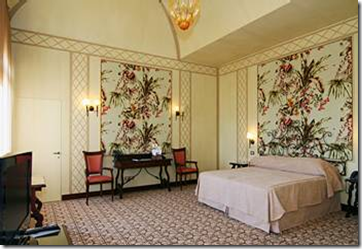

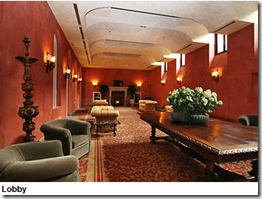
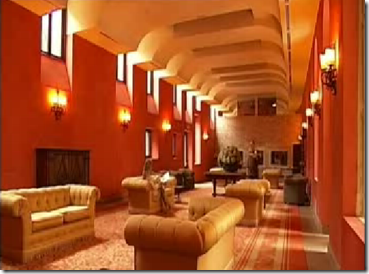


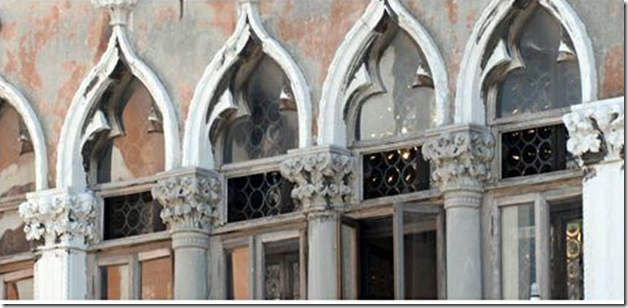
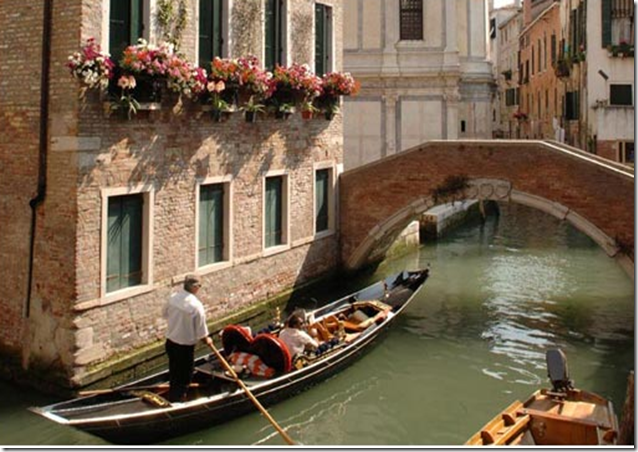
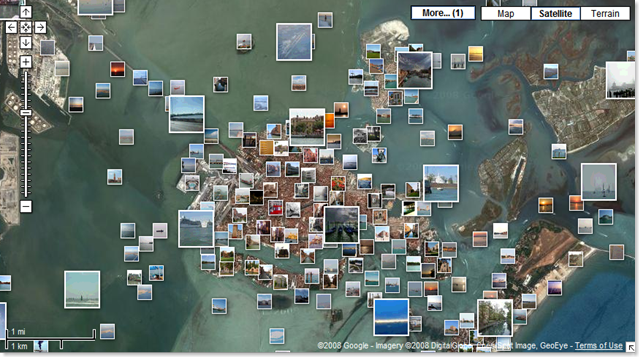


0 comments:
Post a Comment